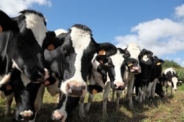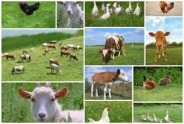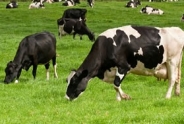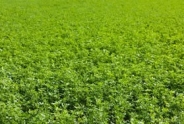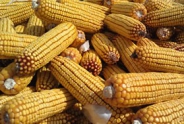Sandhills Calving System - Not Just for Beef
Nancy Glazier, Small Farms & Livestock Specialist
Northwest New York Dairy, Livestock & Field Crops
June 27, 2013
The snow pack is still plenty deep in the pastures, but it's not too early to think about calving, or kidding or lambing. If you have livestock birthing on pastures, think about the Sandhills System. I have a new appreciation for this system after visiting the Sand Hills (both names are used) last fall on the beef tour with Mike Baker, Cornell University beef cattle extension specialist. That part of Nebraska is expansive with rolling hills. There are ample acres to implement this system with low stocking density due to lower yielding land. And the hills are certainly sandy; the tour bus actually got stuck.
The Sandhills calving system separates cow/calf pairs from the rest of the herd. Dr. David Smith, veterinarian, University of Nebraska at Lincoln has done has done research on this. He states the primary reason is to keep the newborns away from the disease-carrying older animals to reduce the risk of scours (diarrhea). This also reduces the pathogen load with fewer animals in the paddock. Scours causes the biggest death loss of calves; they are the most susceptible for the first 2-3 weeks, and then the risk tapers off.
Here are the principles: Pregnant cows are grouped together. After one to two weeks of calving, the pairs stay in the first paddock with the remaining cows moved to a new paddock. After the next week, any cows still pregnant move to another paddock with pairs remaining. This continues on until all calves are born. After the youngest calves are 4 weeks old, the pairs can be recombined into one group.
Our pasture land is not as vast, but the principles of the calving system can be utilized here. Birthing outside in the right location may be healthier than inside a barn. The system requires additional management; paddocks need to be sized to carry the pairs for the expected residency (time period). If pastures are not growing, that means hay needs to be fed. If they are growing that means estimating the forage available for the time period for the number of livestock. Birthing season may be like a lopsided bell curve with a few early births, followed by the majority of the herd, then stragglers. Ideally, fall would be the best time to start planning for this method and leave the pasture area taller at the end of the grazing season for groundcover and possibly feed. The same birthing practices are still needed for healthy newborns.
Prevention is best approach. Vaccinate routinely and maintain adequate nutrition. If you're not ready to attempt this with the whole herd, maybe try this with the heifers. They may have lower antibody levels and poor maternal skills.
If you have questions on this, let me know. I know a producer that utilizes this for his heifers, maybe you could visit his system!
Upcoming Events
Inaugural New York State Agritourism Conference
November 10 - November 11, 2025
Saratoga Springs, NY
SAVE THE DATE! Inaugural NEW YORK STATE AGRITOURISM CONFERENCE presented by Cornell Cooperative Extension Agritourism Program Work Team
2026 Corn Congress
January 14, 2026
Henrietta, NY
Vendor Registration for the 2026 Corn Congress OPEN November 10th, 2025!
2026 Soybean & Small Grains Congress
February 11, 2026
Henrietta, NY
Announcements
The NWNY Team is Hiring!
The NWNY Dairy, Livestock and Field Crops Team is currently looking for an Area Dairy Management Specialist as well as a Small Farms and Livestock Specialist:The full position descriptions and instructions on how to apply are available here:
Area Dairy Management Specialist: https://academicjobsonline.org/ajo/jobs/30185
Small Farms and Livestock Specialist: https://academicjobsonline.org/ajo/jobs/30979
Follow us on Instagram
See photos and reels of our most recent events and programs!Join us on Facebook!
Follow us on Facebook to get up to date posts about events, workshops and everything NWNY!Add us on LinkedIn!
Connect with us on LinkedIn to get more information about upcoming workshops and programs!

